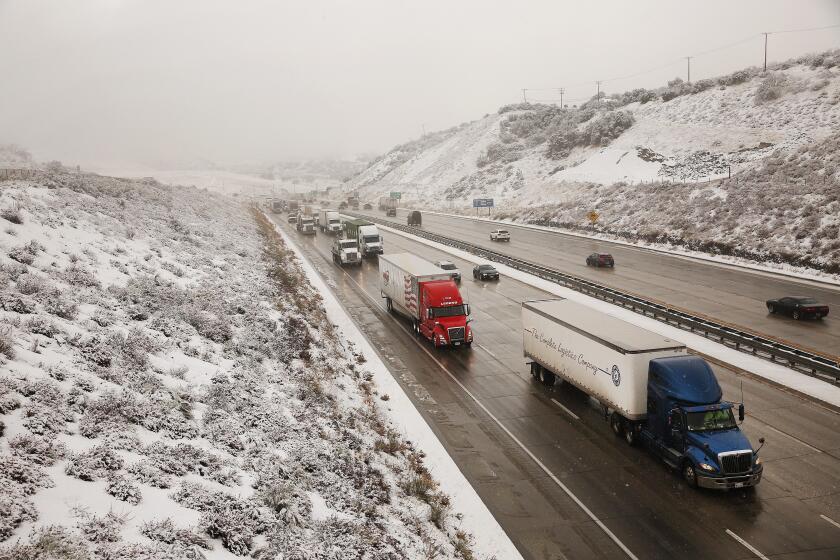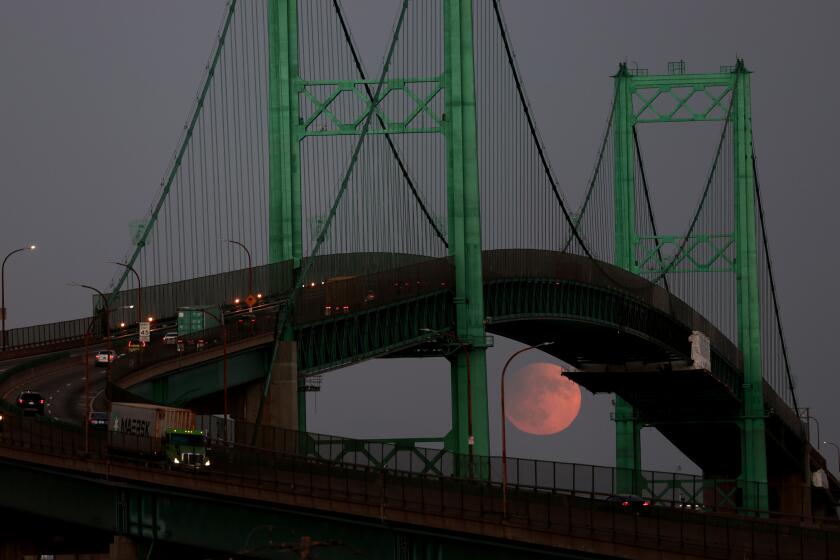Official pushes for L.A. toll lanes
To reduce traffic congestion, the Los Angeles area needs to experiment with charging motorists to drive in special freeway lanes during peak periods, a Bush administration official told the Metropolitan Transportation Authority board Thursday.
Tyler Duvall, assistant secretary for transportation policy at the U.S. Department of Transportation, said congestion pricing can improve the flow of traffic by giving motorists the option of paying a fee to travel faster during peak periods.
Drivers are suffering huge time delays and travel is becoming more unpredictable because of heavy traffic in urban areas, he said.
The Bush administration strongly encourages “experimentation and exploration” of ways to reduce congestion through peak pricing, Duvall said.
One of the examples administration officials cite is the success of toll lanes on the 91 Freeway between Orange and Riverside counties.
Duvall suggested that one approach to congestion pricing in Southern California might involve letting drivers of single-occupant vehicles (other than hybrid or natural gas-powered cars with stickers) pay to use carpool lanes or special toll lanes at peak times.
The 13-member MTA board, which includes Los Angeles Mayor Antonio Villaraigosa, three of his appointees and the five county supervisors, has been wary of congestion pricing because of fears that it would prove unpopular with voters in a region so dependent on the automobile.
In August, the Bush administration chose New York City, San Francisco, Seattle, Minneapolis and Miami to receive shares of $850 million in federal grants to institute various congestion pricing programs. Los Angeles lost out in the competition because the MTA failed to include a congestion pricing plan in its application to Washington. “It just fell a bit short,” Duvall said.
Villaraigosa appointee Richard Katz told Duvall that the Los Angeles region is “a little more challenging” than most urban areas because commuters travel in so many directions during peak periods and because there is no single downtown destination.
Duvall acknowledged that Los Angeles has “a very huge and complicated highway system” but said the region also could benefit from congestion pricing.
Advocates of congestion pricing believe that making motorists pay a fee or toll for a faster and more reliable commute at peak times will discourage unnecessary driving and improve the flow of traffic.
Studies in Los Angeles and elsewhere have shown that a significant number of those driving during rush hours are not commuting to or from work, and might be willing to shift their travel to off-peak hours if faced with a fee.
To cut traffic, reduce greenhouse gas emissions and finance expanded mass transit service, London is charging motorists to drive into the central city on weekdays. New York Mayor Michael Bloomberg has proposed a similar fee to drive into Manhattan, but New York state lawmakers have balked at the idea.
Anticipating the concern of some elected officials that congestion pricing is unfair to the poor, Duvall suggested that drivers of all income levels can benefit. He used the example of a low-income mother who pays to use a toll lane because she needs to pick up her son or daughter from day care by a certain time or face a late charge.
County Supervisor Yvonne Brathwaite Burke expressed the hope that the federal agency would weigh regions differently when deciding where to award grant money. She urged the Bush administration to factor into its decisions the driving patterns of the area’s low-income residents.
Duvall said he recognizes that solutions to the congestion problem have to be “flexible and tailored” to the needs of each urban area. But he added that it’s important that the federal government “send a signal to people about the true costs of moving on an urban highway.”
More to Read
Sign up for Essential California
The most important California stories and recommendations in your inbox every morning.
You may occasionally receive promotional content from the Los Angeles Times.










